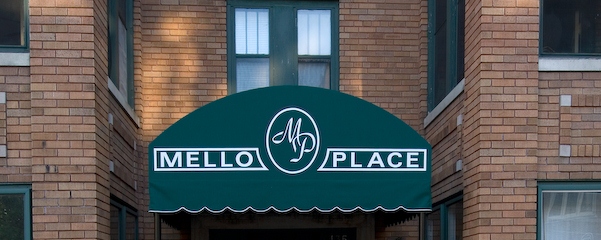South Bend, Indiana
Between the house and tallow crumbling
Wall of the disused carriage house, a line
Of apple trees in blossom, grayed with rain,
Is “smoking” petals for the death of Spring.
Or that’s the verb I found somewhere in Tennyson
To speak of a mediaeval April not
Unlike this one, with all the fertile rot
And antique bric-a-brac in the back garden.
The day is cold and a stone seraphim
Awaits with vine-wracked wings upon their flight,
Observing while he may the petals’ white
Penumbra gathered in the grass’s thin
Grip. There, it intersects with branches cast
Into a circular midday shadow: Volatile
Diagram sketched of silhouette and petals
Whose figure-eight weaves present, future, past,
In what has neither end nor origin.
I’ve milled about these trees for five months now,
While out to smoke a cigarette, and frowned
At wintering branches and the tasteless sin
Of wire fences, industrial concrete
Impinging on what otherwise might seem,
Not Eden, but some genteel type of dream.
Time has sullied taste till, save in discrete
Borders, most pastorals are just fantasies
These days. Nor can stone angels fill the role
Of resurrecting fearful miracles
From the tomb of three centuries’ industry.
Between crass pessimism and my house,
The row of dwindling clouds of blossom stands.
Seventy years ago, there was a bland
Garden for servants here, and servants housed
In what are now my rooms. The novelty
Of English brick, kiln-baked tile, a view
Of that slouch mansion now called Tippecanoe,
Evoke this house’s extinct pedigree.
With the decay of Studebaker and steel,
An age of maids and chauffeurs passed. South Bend
Became a town of decorous fortunes spent,
Where late-Victorian houses are “a steal.”
So in this last fistful of years, new owners
Have tried with copied statues, period plants,
And trees that shed a vintage radiance,
To renovate this tomb to all that’s former.
I’ve breathed its dust in, taken careful note
How plastic urns break in the snow; how I
Can merely mock at stone’s sad history;
Pronounce its fate, perhaps, but just in quotes.
When sun is overhead and wind has blown,
A row of trees both green and bare with Spring
Will cast no shadow, and the petaled ring
Will have dispersed across the sinking ground.
In our tradition, there is such thing as a regional poet, but I never set out write like one. That said, the landscape of South Bend and of Mishawaka always struck me as the most compelling of subjects, always just themselves, but also always the adequate symbol for the bind into which we have gotten ourselves. Here, I tried to contrast and combine the permanent and the evanescent: the petal-and-shadow figure of infinity asserted by the Spring in a moment’s fortuity; the smoke of literary permanence, which streams off into the smoky and arcane air of an increasingly distant past; the smoke nonetheless of a permanent word, a fading meaning, and the smoke of some occupant of the remanents and ruins of a once hopeful Victorian spirit.
Those who know Elthan Place and Mello Place will also know that the former was the guest house, the latter the servants’ quarters, both occupying the southwest corner of the Studebaker family’s estate in the old South Bend. They sit now as apartment buildings (which I have mentioned on FPR before), treated to the care I mention in the poem. This poem combines the two places (in both of which I lived for a number of years), and takes a few other liberties, though the angels, urns, and cyclone fencing are all true as true can be. I have other poems set in this place, which I shall share as they appear in various magazines in the years ahead.
This poem first appeared in the July issue of Chronicles. Copies of my limited edition book of poems, Four Verse Letters (2010), remain available — oh, ever so available! — and you can get a copy by writing to fourverseletters_at_gmail.com




